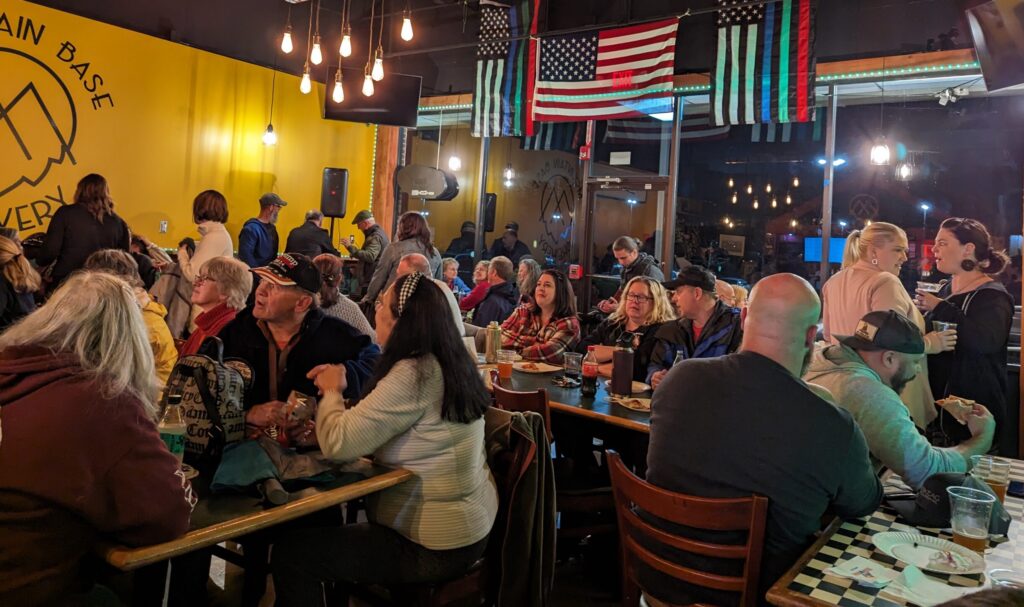Katie Anderson never felt comfortable being a woman or with the idea of becoming one. It was something she would outgrow, but not before the internet and the system convinced her she could be male.
Katie shared her story last night at the Mountain Base Brewery in Goffstown to a crowd and curious room—the journey of a confused young woman who went from hormone therapy to gender surgery and back.
Katie says she never felt like she never fit in growing up, had little interest in boys, and had always been a classic example of a tomboy. At one point in high school, she took what she called the lesbian test. She said it had one question. Would you have sex with any of the boys in the room with you? Her answer was a resounding no, which was not clinically relevant. The test was oversimplified and rigged, but she assumed she was a lesbian.
After spending a bit too much time seeking affirmation on YouTube (these days, it’s TikTok or Instagram) and trying to address her growing discomfort with her sexuality, she began a social transition. She started dressing like a boy, asking her friends and family to refer to her as such, and using a boy’s name she’d chosen. This led naturally to thinking she could or should become one, and she started testosterone treatments.
It all affirmed her idea about her identity, but she did mention how the path to regular testosterone self-injections was too easy. The system never challenged the idea, and maybe it couldn’t or didn’t want to. There was very little in the way of therapy or mental health analysis; they just took her at her word and pushed forward. They taught her how to self-inject the hormones.
And the drugs made her feel happy. Happier than she could remember being. As it turns out, testosterone will do that, and the happiness is not real. But after a year of treatment, she pursued the physical transition. She got top surgery first, a double mastectomy, which further affirmed the identity she had chosen. But there was a new problem. Pain.
The testosterone had weakened her uterine muscles, and she was in constant discomfort. This was normal, they said, the cure for which could have been to stop taking testosterone, but no one appears to have suggested that. Instead, she signed off on a hysterectomy, and why not – she was a boy, after all, which the doctors then screwed up. She almost died from internal bleeding but survived and seemed content with the outcome.
One day, however, at some point after that, she suddenly felt like she was supposed to be a woman and decided to detransition.
Katie talked about the various steps in transition and how each one created a high that ended as if it were an addiction. One that, after all the treatments and surgeries, stopped giving her that affirmation. She would plateau, take it to the next step, and plateau again. There was nothing else to do to keep the high going.
Alluding as well to the high rate of suicide for transitioners and perhaps how hitting that wall drove them to try and kill themselves. Especially if you begin to have doubts, it is easier to contemplate suicide than detransitioning.
Not only is it physically and emotionally demanding, but there is no medical or mental health support, and the community turns against you immediately. Being you is not what they support. They want you to be them.
Katie stopped taking testosterone after “the haircut,” and saw a doctor, and started taking estrogen. She wanted to be and feel like a woman again.
She talked at length about how there are medical codes for transitioning but none for detransitioning, so there is no reliable data on how many detransition. Many stop taking hormones or choose to behave socially as their birth sex. No doctors or clinics are involved in that process, and it is unclear what details they’d collect or share if you did.
Katie also noted that social media is one of the biggest problems with confusing kids about sex and gender issues. That the community is very one-sided in its support. And that health care focuses more on transitions than detransition.
I’d agree. In New Hampshire, it is illegal to counsel anyone away from transition. You can only affirm a patient’s curiosity even if they want help being comfortable with their birth sex.
That’s not therapy. It doesn’t help. And it is why so many who stumble into the gender sphere end up trying to kill themselves. The so-called support of the community is tenuous and inadequate. Having others affirm your choice to be like them does not provide long-lasting comfort. The difficulties of chemical and surgical transition can be a burden, as is knowing that if you think you made a mistake, you might be on your own for the return journey.
Katie also reminded us that she began her journey as an adult but that these days, there is a lot of pressure on parents and children to transition, to which she objects.
I also agree. Adults who want to take this journey can consent to the consequences. Children have no idea what those are, nor can they adequately be made to understand. Parents who accept or encourage this are guilty of child abuse. Generally speaking, until more people bring lawsuits against therapists, doctors, and hospitals that push kids into these unalterable changes, the practice will continue to be profitable enough to assume the risk.
Make it too expensive, and it will stop.



